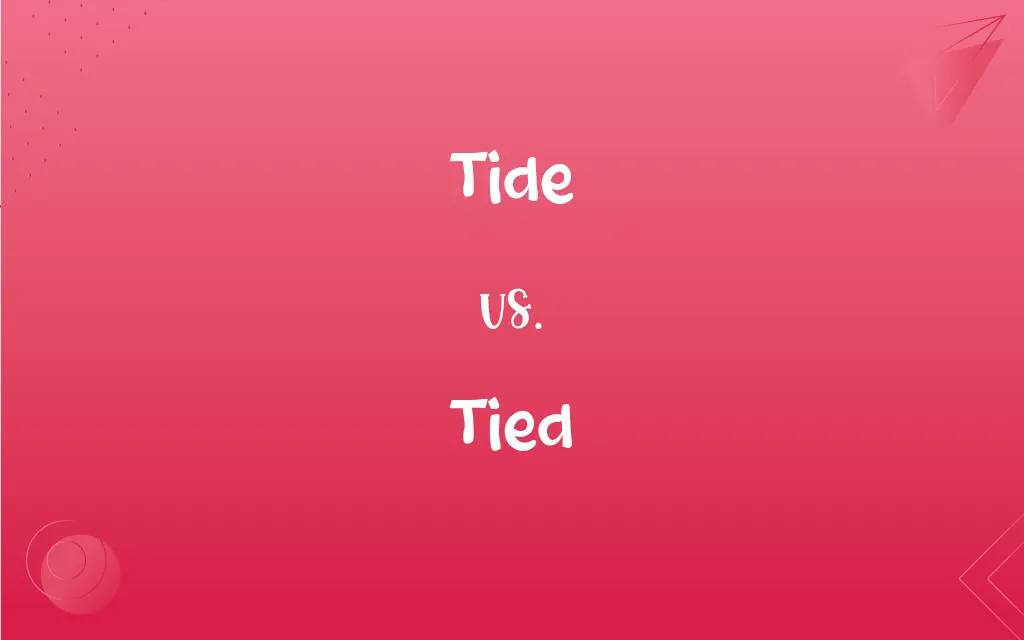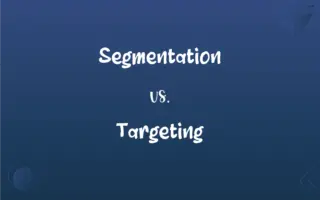Tide vs. Tied: What's the Difference?
Edited by Janet White || By Harlon Moss || Updated on November 18, 2023
Tide is the rise and fall of sea levels; tied means being bound together.

Key Differences
Tide refers to the regular movement of the sea, caused by the gravitational pull of the moon and sun. This movement results in the alternate rising and falling of the ocean's surface. On the other hand, tied is the past tense of the verb "tie", which means to attach or bind something with a string, cord, or similar material. Both words, though they sound alike, have entirely distinct meanings and applications.
In literature, the word tide is often used metaphorically to symbolize a powerful and inexorable force or trend. It can represent the flow of time, events, or emotions. Tied, however, primarily relates to being bound or connected to something or someone. It can suggest a relationship, obligation, or constraint.
When talking about the ocean, tide is an essential concept for sailors, fishermen, and coastal residents. Its patterns can affect their daily activities. Whereas tied might be used in a context where ropes, cords, or even metaphorical binds, like commitments or obligations, come into play.
In everyday language, someone might say they're "going with the tide" to mean they're following the current trend or taking the path of least resistance. Conversely, if someone is "tied up", they might be busy, bound by commitments, or literally bound by something like ropes.
It's essential to recognize that while tide has a specific context tied to bodies of water and their movements, tied is more versatile and can be used in varied contexts, both literally and figuratively. But it's always related to the act of being bound or connected in some way.
ADVERTISEMENT
Comparison Chart
Part of Speech
Noun (primarily)
Verb (past tense of "tie")
Meaning
Rise and fall of sea levels
Being bound or connected
Context
Oceanic movements, flow of events
Attachment, obligations, commitments
Common Phrases
"Turning of the tide", "Swimming against the tide"
"Tied up", "Tied down", "Tied to a commitment"
Metaphoric Use
Symbolizes flow, change, or movement of events
Symbolizes being bound, restricted, or obligated
ADVERTISEMENT
Tide and Tied Definitions
Tide
A specific occurrence of this phenomenon, especially a spring tide or neap tide.
The fish are more active during a spring tide.
Tied
Bound or held together.
Their hands were tied together.
Tide
A current or flow of water or air.
We sailed with the tide.
Tied
Fastened or attached with string or similar material.
She tied her shoes tightly.
Tide
The periodic rise and fall of water level in the oceans.
The tide is high in the afternoon.
Tied
Being in a position of equal score in a game.
The teams were tied at halftime.
Tide
A prevailing trend or tendency.
The tide of public opinion is shifting.
Tied
Restricted or limited.
I'm tied to my responsibilities at work.
Tide
The flow or stream of a liquid.
The tide of molten lava destroyed the village.
Tied
Connected or related in some manner.
Their futures are tied together.
Tide
The periodic variation in the surface level of the oceans and of bays, gulfs, inlets, and estuaries, caused by gravitational attraction of the moon and sun.
Tied
To fasten or secure with or as if with a cord, rope, or strap
Tied the kite to a post.
Tie up a bundle.
Tide
A specific occurrence of such a variation
Awaiting the next high tide.
Tied
To fasten by drawing together the parts or sides and knotting with strings or laces
Tied her shoes.
FAQs
Is tied always used in a literal sense?
No, tied can be used both literally (like tying a knot) and metaphorically (being tied to a commitment).
How is tide different from tied?
Tide relates to oceanic movements, while tied refers to being bound or connected.
Can tide be used in a metaphorical sense?
Yes, tide can symbolize the flow of time, events, or emotions.
What is the primary definition of tide?
Tide refers to the regular rise and fall of sea levels due to gravitational forces.
Are tide and tied homophones?
Yes, they sound alike but have different meanings.
Can "tied" be used to describe relationships?
Yes, people can be "tied" by emotions, obligations, or familial bonds.
Can the word "tied" be used in business contexts?
Yes, a company can be "tied" to a contract or commitment.
How does the moon influence the tide?
The moon's gravitational pull causes the oceans to bulge, leading to tides.
If someone is "tied up", what does it mean?
It can mean they're busy, bound by commitments, or literally bound by something.
What causes spring and neap tides?
Spring tides occur when the sun, earth, and moon are aligned. Neap tides occur when the sun and moon are at right angles.
Is tide always related to the ocean?
While commonly associated with the ocean, tide can also refer to a flow or trend in other contexts.
Can tides affect coastal ecosystems?
Yes, tides can influence marine life, plant growth, and nutrient distribution.
What's the opposite of a high tide?
A low tide.
How often do tides occur?
Typically, there are two high tides and two low tides daily.
How can sailors benefit from understanding tides?
Knowledge of tides can help sailors navigate, anchor, and avoid hazards.
What's a synonym for "tied" in the context of a game?
Even or drawn.
How can tides impact fishing activities?
Tides can influence fish behavior, making certain times more favorable for fishing.
Can "tied" be used in sports terminology?
Yes, it can indicate teams having equal scores.
What's the past tense of "tie"?
Tied.
Is being "tied down" always negative?
No, it depends on the context; it can be negative (restricted) or positive (committed).
About Author
Written by
Harlon MossHarlon is a seasoned quality moderator and accomplished content writer for Difference Wiki. An alumnus of the prestigious University of California, he earned his degree in Computer Science. Leveraging his academic background, Harlon brings a meticulous and informed perspective to his work, ensuring content accuracy and excellence.
Edited by
Janet WhiteJanet White has been an esteemed writer and blogger for Difference Wiki. Holding a Master's degree in Science and Medical Journalism from the prestigious Boston University, she has consistently demonstrated her expertise and passion for her field. When she's not immersed in her work, Janet relishes her time exercising, delving into a good book, and cherishing moments with friends and family.








































































